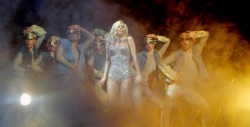
For 33-year-old Crystal Thornton, of Lyles, Tenn., Tuesday evening’s Lady Gaga concert in Nashville was one she had looked forward to for five years.
As she and her best friend, Christina Tugman, settled into their seats in section 103 at the Bridgestone Arena, they were enjoying the opening act when Thornton suddenly began to experience what appeared to be a seizure. Tugman frantically waved down an usher who immediately paged the onsite medics.
Jerry Jones, supervisor with Vanderbilt’s LifeFlight Event Medicine program, was at her side within a minute.
“The patient was unconscious with no heartbeat,” Jones said.
Jones and paramedic Shane Clark used a portable automated external defibrillator (AED) for more than five minutes to get her heart to begin beating again. Along with paramedics Rich Delmotte and Jonathan Webb, they restored her heartbeat and transported her by ambulance to Vanderbilt University Medical Center’s Emergency Department.
“Without an AED, this patient would not have survived. It restored her pulse,” said Leigh Sims, manager of Event Medicine for Vanderbilt.
Upon arrival at Vanderbilt, physicians immediately began the therapeutic hypothermia protocol to cool Thornton’s body temperature to between 93 and 86 degrees Fahrenheit because she was at risk for anoxic brain injury due to prolonged lack of oxygen.
Covers containing circulating cold water were placed over Thornton’s body and around her head. A machine slowly and carefully lowered the body temperature and maintained it for 48 hours.
“The patient received incredible care from the moment she experienced problems at the Bridgestone Arena,” said Jared McKinney, medical director of LifeFlight Event Medicine. “It is only through a coordinated team effort that her successful outcome was possible.”
She was transported to the cardiovascular intensive care unit under the care of cardiologist John McPherson, where she continued to undergo the cooling therapy for two days before slowly and carefully being restored to her normal body temperature.
Thornton regained consciousness, and her neurologic status has improved daily.
Her physicians ran a battery of tests to figure out what happened and why she suffered a cardiac arrest at such a young age.
“It appears that she may have hypertrophic cardiomyopathy, or an enlarged heart,” McPherson said. “This is a genetic condition that, unfortunately, has no warning symptoms and often results in an emergency situation like Thornton experienced.”
Thornton will undergo surgery on Monday to receive an implantable cardioverter defibrillator (ICD) that will automatically restore her heartbeat should she ever experience another cardiac arrest.
“I am so mad I missed the concert,” said Thornton, who has no recollection of Tuesday evening’s event.
It’s an evening her friend Tugman says she will never forget.